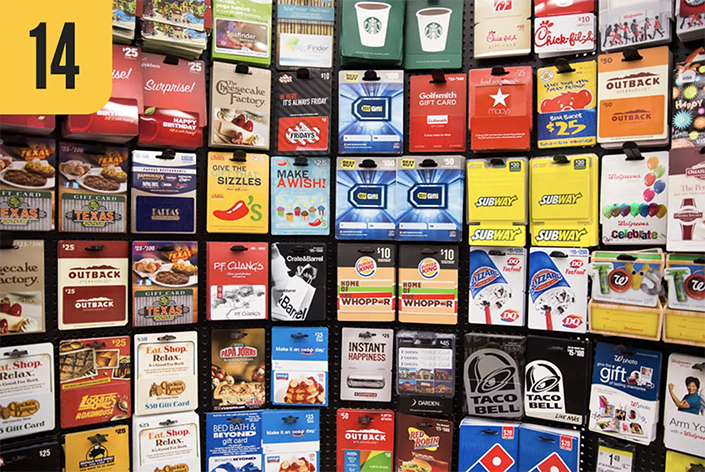
Gift cards are considered godsend in today’s society; world renowned for their ability to salvage last minute shoppers and indecisive or poor gift givers, gift cards have been the most popular present of choice for 13 years. They are so popular that Americans purchased $171 billion worth of gift cards just in 2019.
There is a good reason for this phenomenon. In theory, gift cards are a win-win.
Most of the time givers worry that their gifts will fail to please the tastes of the recipient. They fret over the possibility that the recipient might be better off with a sum of money worth the exact value of the gift. With gift cards, a more festive-yet-equally-efficient alternative to cash, these burdens are lifted off their shoulders.
Those at the other end of gift giving often enjoy gift cards too - mainly because they allow recipients to indulge in simple pleasures like coffees and without feeling guilty.
For these reasons, it is likely that you yourself may have received a gift card in the past. Maybe you used it right away- maybe you didn’t. If you did, you are part of a great minority.
To see if this phenomenon proves to be consistent in Korea, I anonymously surveyed a pool of people about gift cards using the platform Google Forms. Gift cards, in the context of the survey in Korea, are largely exchanged through communication platforms such as Kakaotalk, in which a person can send online gift cards with a message(also known as Gifticons). Non-mobile gift cards are often exchanged in the form of paper gift certifications that are eligible for multiple different stores and restaurants.
17 Koreans and Americans of ages 14~44 responded to a series of questions regarding the frequency of which they received, gave, and not used a received gift card as well as by what means they ended up not using the gift card. The participants were a mix of economically active adults and economically dependent students.
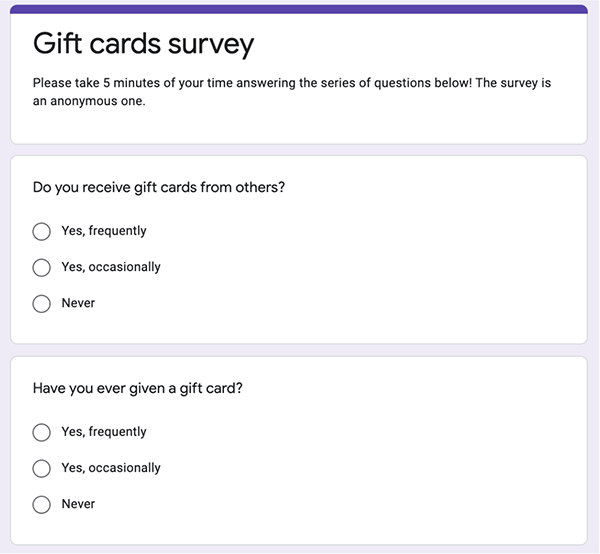
A pie chart of the respondents’ answers show that 47.1% of the respondents receive gift cards frequently, and that 41.2% of the respondents receive them occasionally.
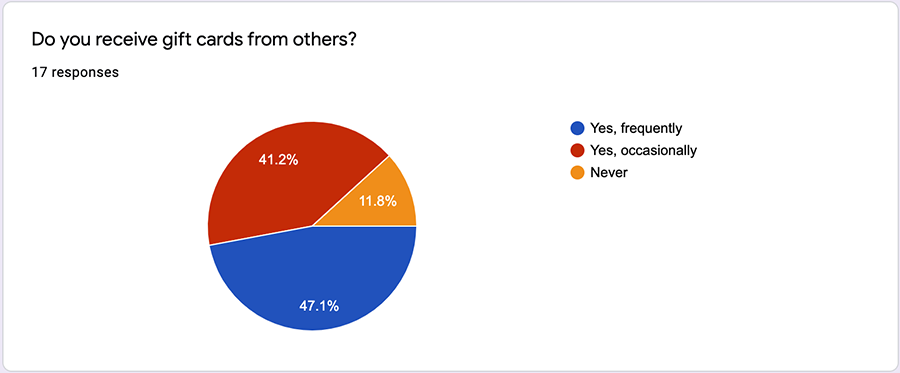
A different pie chart demonstrates that over half of the gift-card receivers use the gift card within the month of receiving it, with almost 20% of receivers using it after more than a year. Only 1 of the respondents claimed that they use gift cards within the day of reception.
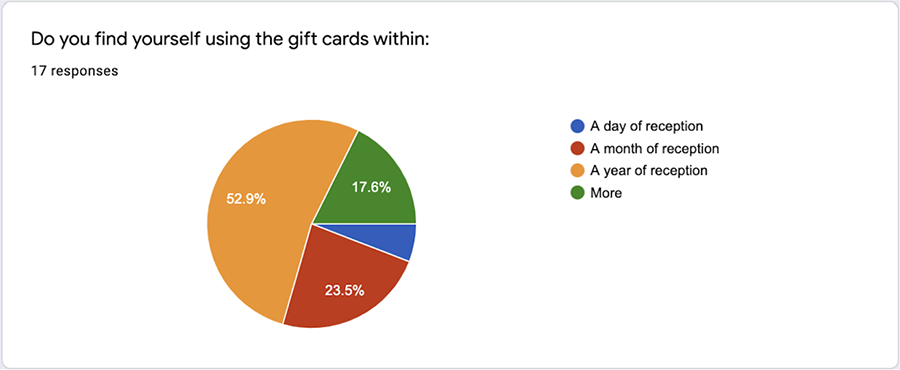
More importantly, as The Hustle had predicted, a majority of respondents claimed that they often do not use their gift cards. 47.1% of respondents claimed that they often do not use their gift cards, and that 35.3% of them occasionally do not do so.
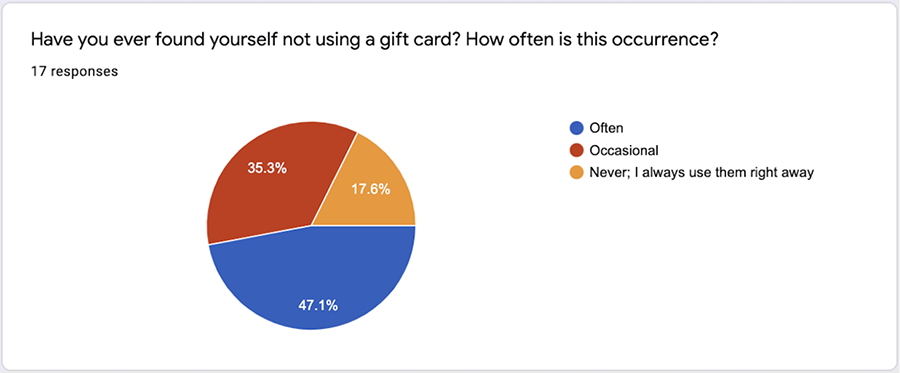
The reasons were various for not using a gift card. A common response was that they “forgot that they possessed a gift card” or that they “forgot where they placed it”.
Regardless of how they ended up not using the gift card, the gift card issuer benefited in every instance.
Why? Corporations love gift cards because unused gift cards are marked as liabilities. And soon, companies can make liabilities into breakage income: the amount of money estimated to never be redeemed. Starbucks made $105 million just from breakage income in 2017. For Korea, the e-gift card market is predicted to reach 3297 million US dollars by 2024.
If there’s a chance that the gift card I give never sees the light of day(and a rather large one at that), with only the gift card issuer making profit at my expense, does this mean gift cards are bad gifts? Not really- and the survey participants seem to agree. Only 11.8% of participants consider gift cards to be inept gifts.
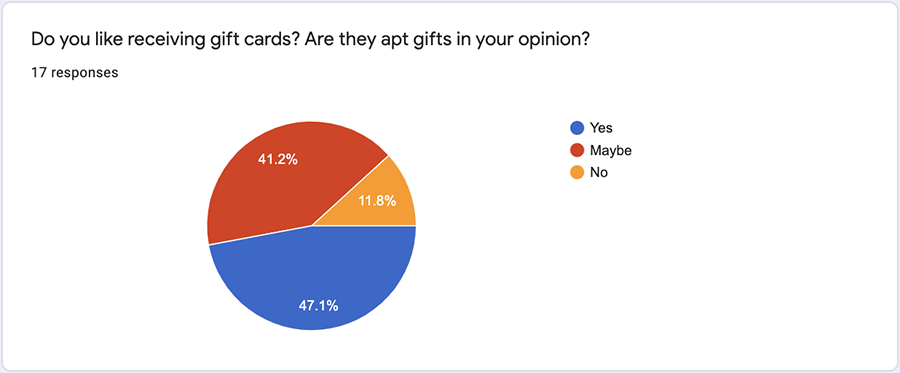
When the participants were asked to support their answers to the question above in the last question of the survey, those who responded “yes” mentioned that they are “small, effortless and light” as well as “easy to use” as most gift cards are mobile and our phones are always present. Those who responded “maybe” to the foregoing question mentioned that “if the recipient is an acquaintance, they are an apt gift; otherwise it might be inappropriate or inconsiderate” and that “if you know what your receiver’s tastes are, then gift cards are good gifts.”
The responses seem to indicate that whether a gift card is an apt gift in a certain circumstance all boils down to what kind of giver-recipient relationship you have, want to signal, or want to establish. Would a simple gift card be an appropriate indicator of your present relationship with the recipient? It also depends on who the recipient is: is the recipient an amnesiac who would most likely forget about the gift within a day? Does giving a Starbucks gift card to a coffee enthusiast sound like a good idea?
And most of all, am I content with making a gift card issuer’s day?

Hannah Oh
Grade 9
Chadwick International School

